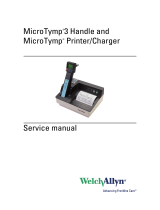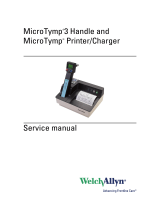Page is loading ...

Last Revised: 9/19/08
Step 1: Materials Needed for an OEM Assembly
1. OEM Printed Circuit Board
2. Silicone Rubber Keypad Overlay
3. Cable
4. Silicone RTV Glue
Step 2: Applying Adhesive to Silicone Overlay
Apply silicone adhesive [iKey recommends SuperFlex by Loctite] to back side of silicone
overlay (keypad). Sparingly dab glue on the middle of each key intersection across the
whole keyboard as seen in this picture. Also apply to inside of center portion of
HulaPoint™ pad (where the sensor/joystick lies) if OEM kit incorporates the HulaPoint™
Be careful not to drop silicone on any key contacts.
Glue
Back of silicone keypad
Back of silicone keypad
Key
Contacts
Key
Contacts
Glue
Glue
Glue
Glue
Glue

Last Revised: 9/19/08
INCORRECT GLUING PROCEDURE
Step 3: Placing Keypad in Enclosure
1. Put the silicone rubber keypad into place on the panel or enclosure you
are using. Do not place PCB yet.
2. Seat the keypad in the mounting cutout by sliding one edge at a time into
the cutout space.
3. Spread the keypad to be sure it is well seated on all four sides. Ensure
that the lip is through the cutout all the way around the pad.
4. When the keypad is in place, gently allow the board to fall into place on
top of the keypad so no glue is displaced onto a key trace, or key contact.
(Note: make sure the PCB and pad are oriented in the same direction.)
5. Tighten hex nuts until keypad is just SLIGHTLY compressed between
panel and PCB. We recommend 1.5 in/lbs. of torque when tightening.
6. Run fingers between all keys to ensure a good silicon and PCB bond.
7. Allow glue to cure for 1 hour
Glue
Glue
Panel
Panel
Panel
Panel
Back Side
of PCB
BACK
BACK
Mounting
Studs
Panel or
Enclosure
PCB
Keypad

Last Revised: 9/19/08
Step 4: Wiring for Keyboard
Add a dab or two of glue on the PCB just in front of the connector so that the cable
header will sit on the glue when connected to the board and make itself more secure.
The picture above illustrates the placement of the glue prior to the connection
USB Cables: Green, White, Matte Black, Black, Red
PS/2 Cables: P2 (Purple, Yellow, Matte Black, Teal, Blue), P3 (Matte Black,
Orange, Brown, Black, Red)
P1
Glue
Glue
Back of PCB near
connector P1
Pin 1

Last Revised: 9/19/08
Custom Cables Signal Layout
Next, connect the cable onto the prongs of J1 as shown above.
* Used for USB interface
** Downstreaming a Mouse Unit* The board MUST be in USB mode to be able
to downstream a mouse.
Your iKey unit is now ready to use with your set up.
If you should have any additional questions, please feel free to contact iKey
directly at (800) 866-6506 or send an e-mail to support.
Keyboard
**Downstream Mouse
P1 (1x5 Header)
P2 (1x5 Header)
PIN
Connectivity Function
PIN
Connectivity Function
1
PS2 Clock/D+ *
1
Clock
2
PS2 Data/D- *
2
Data
3
Chassis Ground
3
Chassis Ground/Drain
4
Signal Ground
4
Signal Ground
5
Power (+5 VDC)
5
Power (+5V)
/



